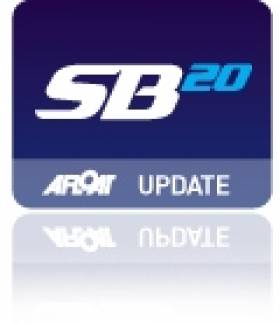Displaying items by tag: Justin Burke
Irish Sailing Clubs Lose Out As Royal Yacht Squadron Hosts 2017 SB20 World Championships
#sb20 – The SB20 keelboat class will hold its 2017 World Championships at the prestigious Royal Yacht Squadron in Cowes.
It's somewhat disappointing news for Irish sportsboat sailing following a competitive tender process from five international sailing clubs including three Irish ones from Cork, Galway and Ulster.
The SB20 World Council voted for the RYS to host the championships. Event dates will be confirmed early in 2015.
As Afloat.ie previously reported last August, Irish SB20 Class President Justin Burke had been urging Irish clubs to get behind the sportsboat bid and bring the Championships here for a second time.
Ireland previously hosted the inaugural worlds – when the class was known as the SB3 – in 2009 at the National Yacht Club in Dun Laoghaire attracting a massive fleet of 163 boats divided into two flights.
Ed Russo, President of the SB20 World Council, commented: "We are excited about the opportunity of the Royal Yacht Squadron in Cowes hosting the 2017 SB20 Worlds. The Solent is where the first SB20 fleet began and we expect a significant number of participants from the 13 fleets around the world to return to the founding waters for this event."
The Royal Yacht Squadron is one of the most prestigious yacht clubs in the world, the host club of the very first America's Cup race (held around the Isle of Wight in 1851), and founder of the famous Cowes Week regatta. With its spectacular canon start-line at Cowes Castle, the Squadron hosts top level racing events on the Solent waters each year.
Rear Commodore (Yachting) Jonathan Perry commented: "The Royal Yacht Squadron is delighted to have been selected to host the SB20 World Championships in 2017. The Solent provides challenging sailing conditions for this truly international class, which we look forward to welcoming to Cowes."
The SB20 class is an international one-design keelboat sailed by three or four people which offers incredibly close 'level' racing, attracting both amateur and professional sailors of all ages. It is a familiar sight on the Solent, and provides superb value for money with class starts and one-design fleets at major regattas such as Aberdeen Asset Management Cowes Week, as well as its own class championships and Grand Slam circuit.
The SB20 class has over 750 boats sailing worldwide with established fleets in the UK, Ireland, France, Italy, Portugal, Netherlands, Belgium, Germany, Ukraine, Russia, Dubai, Singapore and Australia, and regularly attracts fleets of over 100 boats for international events. A global fleet is expected for the 2017 World Championships as well as a strong UK entry.
The SB20 will hold its 2015 World Championships at Torbole, on Lake Garda, Italy and in 2016 in Cascais, Portugal, giving the fleet three superb venues for the next three overall World Championship contests, which also include Youth, Masters and Ladies titles.
O'Neill Makes Clean Sweep of Bay SB3 Prizes
Barry O'Neill made a clean sweep of the prizes for the third year running in the SB3 class on Dublin Bay. James Gorman showed form to win series 3.YC. The class announced its annual Dublin Bay Sailing Club prizewinners ahead of the prize giving ceremony, on of the biggest nights of the sailing year in Dun Laoghaire, on Friday 12th November at the Royal St.George YC. The winners are:
SB3 DBSC Prize Winners 2010
Sunday Overall
1st. Sin Bin Barry O'Neill 1st. Silver Fleet Bob Hobby
2nd. Alert Packaging Justin Burke
3rd. Seriously Bonkers Martin Cuppage
Sunday Series 1
1st. Mephisto Stephanie and Tim Bourke
2nd. Seriously Bonkers Martin Cuppage
3rd.Alert Packaging Justin Burke
Sunday Series 2
1st. Alert Packaging Justin Burke
2nd.Sin Bin Barry O'Neill
3rd. Design Security Colin Galavan
Sunday Series 3
1st. Odin James Gorman
2nd. Sin Bin Barry O'Neill
3rd. Seriously Bonkers Martin Cuppage
Thursday Overall
1st. Sin Bin Barry O'Neill
2nd. Design Security Colin Galavan
3rd. Alert Packaging Justin Burke
Thursday Series 1
1st. Sin Bin Barry O'Neill
2nd. Design Security Colin Galavan
3rd. Bom Chickawahwah John O'Driscoll
Thursday Series 2
1st. Sin Bin Barry O'Neill
2nd. Design Security Colin Galavan
3rd. Alert Packaging Justin Burke
SB3 Open Day Attracted Over 30 Sailors
Of the 31 people who came along six from Howth and Burke anticipates further Howth moves into the class. The Galway connection was also renewed and two top Northern Irish helmsmen travelled to the National YC.
SB3 'Open Day' Concept Goes National
What started out as local recruitment drive on Dublin Bay has widened with interest now reported nationwide for next weekend's Dun Laoghaire SB3 Open Day. Sailors are coming from Howth, Galway and Northern Ireland for test sails at the National YC. "We never imagined there would be so much interest from so many locations out side the Dun Laoghaire area" says class captain Justin Burke.
"Our original intention was to encourage local sailors to try out an SB3 but we will look after everyone. The bookings are coming in at a steady rate and everything thing is in place for a great day. We have racing , boat show , demos and video of the Worlds at Lake Garda", he added.
The Sports Boat concept is focused around close competitive racing on 40 minute courses in easily manoeuvrable one design boats. "You do not need a football team to race just 3 people. And above all they are fast. This is not cheque book racing. Everyone has the same boat same sails so it's all about the racing, Justin says.
Although this concept of racing is not new it is very much in tune with the modern life style where free time is at a premium and the prospect of getting 2 competitive races in 2 hours appeals to helm and crew .
Contact Justin Burke 087 2417542 or drop him a line at [email protected] with your name and number to book a test sail
Laser SB3 Open Day in Dun Laoghaire
Sailors who would like to try out a Laser SB3 might be interested to learn of an Open Day at the National Yacht Club in Dun Laoghaire on Saturday 9th October.
The Dun Laoghaire SB3 fleet is inviting sailors to come and try a sail on this exciting one-design performance boat on that day and class members will be on hand to offer information and advice. Registration starts from 9.30am and on the water activity will be between 10.30am and 4.00pm.
On the day, the Class Association will provide RIB transfers to the SB3s which will be sailed in Scotsman's Bay. The day is open to experienced or novice sailors and especially to prospective new owners. A series of short races will also be run to give visitors a feel for the boat in racing conditions while ashore, light refreshments, soup and sandwiches will be provided free of charge.
Those wishing to avail of the opportunity should ideally advise the organisers first of their preferred time slots and make sure they bring their sailing wet weather gear and a life jacket.
To make a provisional booking, call or text Justin Burke on 087 2417542; alternatively e-mail: [email protected]
SB3s Plan Further Expansion with Dun Laoghaire Open Day
New sailors are invited to try a sail on the 'one design performance boat' in a special Open Day on Saturday, 9th October between 1030 and 1600. Registration begins at 9.30am.
Boats will be alongside at the National Yacht Club in the harbour for demo runs and class members will be available to discuss the Sportsboat design.
The recent SB3 Nationals staged in Howth this month attracted a fleet of 48 boats racing with attendance from all the major Irish sailing centres. Internationally Ireland sends a team to the World championships and the inaugural world championships were held here in Dun Laoghaire in 2008 with a massive fleet of 137 boats.
The class association will organising sailing in Scotsman's Bay on October 9th with RIB transfers to the boats. Experienced or novice sailors are all invited to participate. Those wishing to sail ideally should advise the organisers first of their time slots and make sure they bring their sailing wet weather gear and a life jacket. Short races will also be run to allow visitors get a feel of the boats.
To make a provisional booking, please call or text Justin on 087 2417542


































































